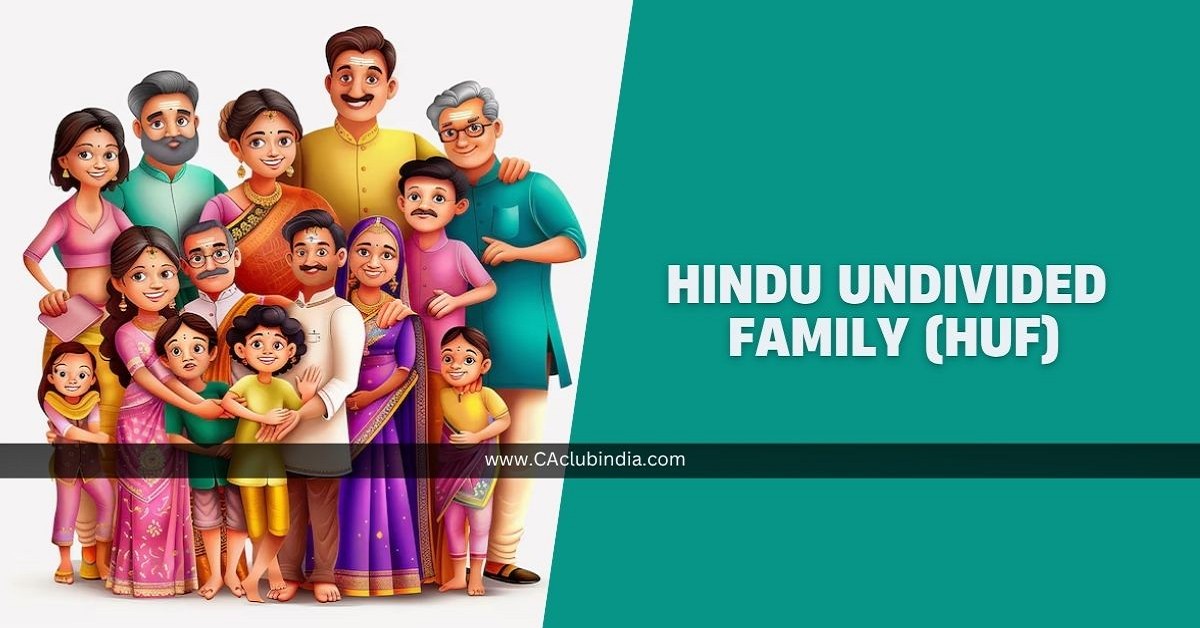The Hindu Undivided Family, commonly known as HUF, is a distinctive concept deeply rooted in Indian tradition and law. It represents a joint family system where several generations live together and share collective ownership of assets. Beyond a familial bond, the HUF is a separate entity recognized for income tax purposes, offering a strategic advantage for wealth management and tax planning.
Defining HUF: What Professionals Should Know
An HUF consists of family members descended from a common ancestor, including wives and unmarried daughters, governed under Hindu personal laws. The eldest male member, referred to as the Karta, holds the responsibility of managing the affairs and assets of the family, while other members (coparceners) have rights in the property.

The Income Tax Department regards HUF as a separate taxpayer. This means the HUF can independently hold assets, generate income, and file tax returns, distinct from the individual members. While an HUF forms naturally when a Hindu family lives jointly, formal registration with a Permanent Account Number (PAN) and maintaining a bank account in the HUF's name are essential for financial transactions and compliance.
Strategic Advantages of Forming an HUF
An HUF structure presents several tangible benefits, especially from a tax perspective:
- Tax Efficiency: As a separate legal entity, an HUF's income is taxed independently of its members. This allows income splitting, which can significantly reduce the overall tax outgo for the family.
- Dual Tax Deductions: Both the HUF and individual members can claim deductions separately under Section 80C, effectively enabling twice the tax-saving potential on eligible investments.
- Succession Ease and Asset Protection: HUF facilitates seamless wealth transfer to subsequent generations while retaining collective management of family assets.
- Operational Simplicity: Unlike corporate or partnership businesses, HUF formation involves minimal procedural requirements, relying on customary joint family living.
- Separate Financial Identity: The ability to open bank accounts and hold investments in the name of the HUF simplifies administration and enhances clarity in family finances.
Important Considerations and Potential Limitations
Despite its benefits, an HUF is not without challenges:
- Centralized Control: The Karta wields significant authority, making unilateral decisions regarding the family's assets which may occasionally create internal friction.
- Liability Risks: The Karta bears unlimited liability for HUF debts, putting personal assets at risk in adverse situations.
- Consensus Needs: Joint ownership means that asset sales or partitions require agreement among coparceners, sometimes leading to delays or disputes.
- Tax Compliance Complexity: Although tax benefits exist, the regulatory environment is stringent. Improper accounting or in-family transactions may attract tax scrutiny.
- Modern Family Structures: With increasing nuclear families, the traditional joint family model underlying HUF is less prevalent in urban settings, impacting its applicability.
Income Tax Slab Rates for HUF (AY 2026-27)
For the Assessment Year 2026-27, the income tax slab rates applicable to HUF under the new tax regime are:
|
Annual Income (INR) |
Tax Rate |
|
Up to Rs 4,00,000 |
Nil |
|
Rs 4,00,001 to Rs 8,00,000 |
5% |
|
Rs 8,00,001 to Rs 12,00,000 |
10% |
|
Rs 12,00,001 to Rs 16,00,000 |
15% |
|
Rs 16,00,001 to Rs 20,00,000 |
20% |
|
Rs 20,00,001 to Rs 24,00,000 |
25% |
|
Above 24,00,000 |
30% |
Important Note on Rebate under Section 87A
It is crucial to note that the rebate under Section 87A is not available to Hindu Undivided Families (HUF). This rebate, which allows individuals with income up to Rs 12 lakh to claim a tax rebate (effectively reducing their tax liability), is exclusively applicable to individual taxpayers. Despite HUF being a separate taxable entity, it is excluded from claiming this rebate, and therefore, HUFs cannot reduce their tax liability under Section 87A.
Illustrative Scenario: Using HUF for Tax Optimization
Consider a family receiving considerable rental income from ancestral property. Without an HUF, this income is taxed in the hands of a single individual, potentially pushing them into a higher tax bracket. By transferring property ownership or income rights to the HUF, that income is taxed separately, easing the individual's tax burden and resulting in overall tax savings.
|
Income Description |
Individual Income (INR) |
HUF Income (INR) |
Total Tax Efficiency |
|
Pre-HUF Income Splitting |
35,00,000 |
0 |
Higher tax liability |
|
Post-HUF Income Splitting |
24,50,000 |
10,50,000 |
Reduced overall tax liability |
Conclusion
For professionals navigating wealth management and tax strategies, the Hindu Undivided Family offers a unique and valuable framework. By blending tradition with financial prudence, HUF can help families safeguard assets across generations while optimizing tax outcomes. However, to fully leverage its potential, expert guidance is recommended to manage risks and ensure compliance with evolving laws.
Disclaimer: This article is intended for general awareness and informational purposes only. Readers are strongly advised to seek professional advice based on their specific facts and circumstances before making any decisions or drawing conclusions based on the contents of this article.
The author and publisher are not responsible for any loss or liability incurred by any person who relies on this content without appropriate consultation.
The views expressed herein are based on the author's personal understanding and interpretation of the applicable tax laws, which are subject to change and judicial review.
The author can also be reached at office.bhavikco@gmail.com










 CAclubindia
CAclubindia
